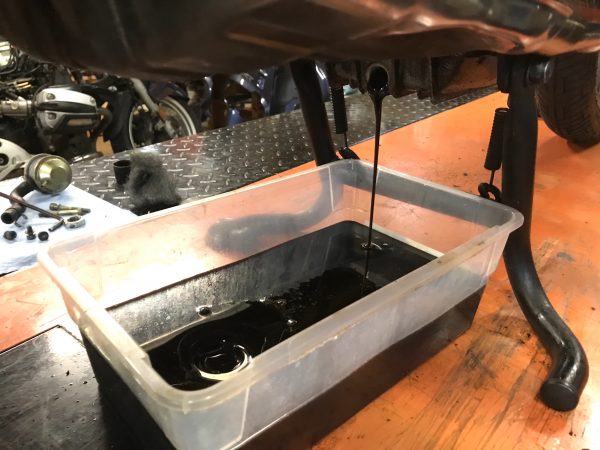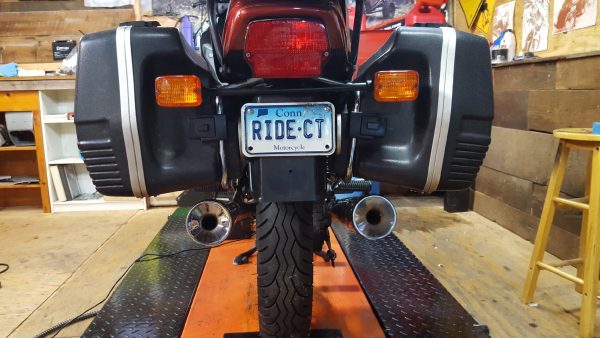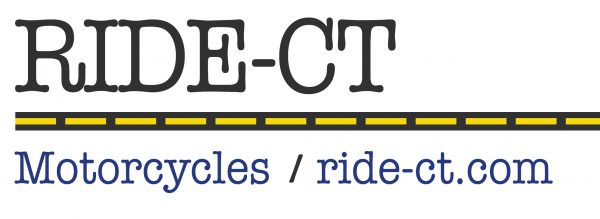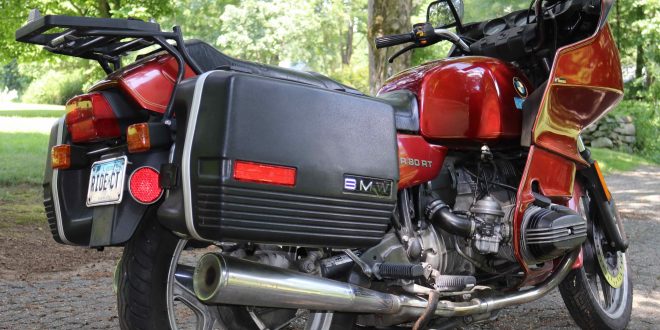HARWINTON, CT – Are classic motorcycle (and car) owners in Connecticut routinely being ripped off through inflated property assessments; assessments that sidestep state law?
That seems to be the case, but there is a way to prevent being taken advantage of and save money: Check your tax bill closely before paying. Doing so just saved me $162.40. I know; that line sounds just like an insurance commercial.
It was in late June when the bills for real estate and motor vehicles arrived, and one line on the motor vehicle bill contained a shocking assessment. The well-used 1987 BMW R 80 RT that I acquired a year ago for $750 in non-running condition was valued at an eye-popping $6,300.
Assessment Far, Far Too High
Having owned a few antique BMWs over the years and having a sense of the vintage Beemer market, I knew the assessment was far, far higher than what my bike is actually worth. An online check of NADA book value showed the model to be pegged at $630 in fair condition. Could an extra zero have been added to the assessment?
Even in excellent shape, NADA said the model was only worth $2,665. My R 80 RT is relatively OK. It has a bit of rust, some dings to the fairing, a damaged mirror that perhaps needs replacing, and a head gasket that weeps. By NADA’s reckoning, it’s probably worth $1,000, which admittedly is much less than what I could sell it for.
Kelley Blue Book, meanwhile, put the bike’s typical sales price at $3,320 in good condition. Old BMWs are becoming collectible, so the true market value for my R 80 RT is likely closer to Kelley’s number even in its fair condition. If I wanted to sell it – and I don’t – I might get $3,000 or a bit more.
The bike had been sitting for years when I bought it. Factor in the cost of new tires, battery, fluids, an instrument cluster rebuild, some tweaking by one mechanic, and a valve adjustment and some detective work for an electrical issue by another and I might be able to clear $200 or $300 if I sold it.

After stewing a bit over the bill, my plan was to visit the tax assessor’s office and see if the assessment could be lowered on the spot or whether I’d have to go before the Board of Assessment Appeals and beg for a reduction. I certainly didn’t want to pay $176.40 for a 32-year-old motorcycle.
New Hartford Provides Form Online
Then I recalled what a friend from New Hartford had told me roughly a year ago. He said that on his town’s website (newhartfordct.gov) there’s a printable “Affidavit of Antique Motor Vehicle” form that can be filled out, notarized and turned in. The assessor then adjusts the assessment for the classic vehicle listed on the form to $500.
The form notes that a Connecticut statute states that any vehicle 20 years or older “shall not be assessed for more than $500.”
A little digging and I confirmed the law. Vehicles having classic license plates automatically get a $500 assessment. The law also says that those with non-classic plates may be “required by assessors to provide reasonable documentation” that their vehicle is an antique to get the $500 assessment.

My BMW has a regular plate, so no automatic $500 assessment. New Hartford requires that a form be filled be out. What would Harwinton need?
Other questions soon started popping into my head:
If I was ignorant of the $500 assessment limit might other classic vehicle owners be, too, and how many are unknowingly forking over too much every year?
Had I paid the tax bill without studying it would I have been the only sap?
Instant Adjustment In Assessment
Armed with my tax bill, I went to the assessor’s office and asked if the assessment for the BMW could be reduced. Voila! It was immediately slashed to the state limit of $500. I will now pay an even $14 for owning it. As previously noted, that’s a savings of $162.40.
Why the excessive and erroneous $6,300 assessment to start with? I was told at the assessor’s office that the state Department of Motor Vehicles, not the town assessor, determined the value. A check with the DMV revealed that it’s the state’s Office of Policy and Management that recommends values based on NADA guides, and that the DMV merely passes them on when providing a list of vehicles to every town.
So why was OPM’s assessment of my BMW more than double the NADA figures that I called up online?
Are Assessors Purposely Ripping Off Owners?
According to the DMV, “The authority to assess the value is under the jurisdiction of the town assessor,” which suggests that local assessors are perhaps knowingly engaging in a money grab; victimizing antique vehicle owners who don’t have classic plates and who don’t know the law.
To follow the law, assessors would have to go through the list of vehicles provided by the DMV, isolate antique vehicles with non-classic plates, and adjust each assessment to $500. Instead, they rely on owners to catch them overcharging and demand a fix.
At least New Hartford is transparent about the law, but how many other towns aren’t? How many are purposely cheating owners of classic vehicles through larcenous, over-stated assessments?
Check Your Property Tax Bill Closely
The lesson here is if you have an antique motorcycle (or car) that has a regular license plate be sure and check the assessment on your tax bill. It could be wildly incorrect. Even if it’s only modestly more than $500, challenging it should save you money.
As luck would have it, an actual victim soon presented himself. While out having lunch last Wednesday, I ran into Rich Hastings, a Harwinton motorcycle collector. He has a 1969 Triumph TR6C Trophy and a 1982 Honda GL1100 Gold Wing, both with regular plates. I mentioned to him the subject of this column. He replied that he’d just paid his taxes but would check his tax bill when he got home.
The phone rang a short time later. Hastings reported that the two bikes were assessed for $750 each. At the time, he planned to return to town hall and inquire why. That left me wondering how many more victims are there across Connecticut?
Monday afternoon, Hastings called again to report that he had visited town hall and was getting a $12 refund.
(A version of this column originally appeared in the “Republican-American” on July 27, 2019.)
 Ride CT & Ride New England Serving New England, NYC and The Hudson Valley!
Ride CT & Ride New England Serving New England, NYC and The Hudson Valley!



Because I am on the Board of Finance in my little town I am probably more aware than most as to the inner workings of the tax and assessment process. Knowing both the assessor and tax collector personally I am certain they aren’t “trying” to rip anyone off. Because our town is small the town hall is only open 2 days / week. Both the tax collector and assessor work for multiple towns part time to make ends meet. I imagine this leads to some oversights and clerical errors. I have a 2012 Harley Ultra Classic that last year was assessed at $9,580. I just received my tax bill and it is now valued at $10,580. You can bet I will visit the assessor and have her look into why my 7 yr old bike went up in value by more than 10%. The bottom line is you need to check your tax bill on everything you own to make sure the valuations are correct/reasonable. And of course, nobody’s perfect – everyone makes mistakes.
Connecticut is just one huge rip off.
Sec. 12-71 … “(b) Except as otherwise provided by the general statutes, property subject to this section shall be valued at the same percentage of its then actual valuation as the assessors have determined with respect to the listing of real estate for the same year, except that any antique, rare or special interest motor vehicle, as defined in section 14-1, shall be assessed at a value of not more than five hundred dollars.”
Do you have the Connecticut statute number which states that any vehicle 20 years or older “shall not be assessed for more than $500.”
Thank you.
Wow, I am getting ripped off. I was wondering why my 1985 BMW K100RS was worth so much. I knew if I sold it I wouldn’t get anywhere near what the town says it’s worth. I’m going to town hall this afternoon. I would have an antique plate on it but would rather have the Handicapped plate that I have now. I’m sure town hall will play dumb, that’s what they do best.